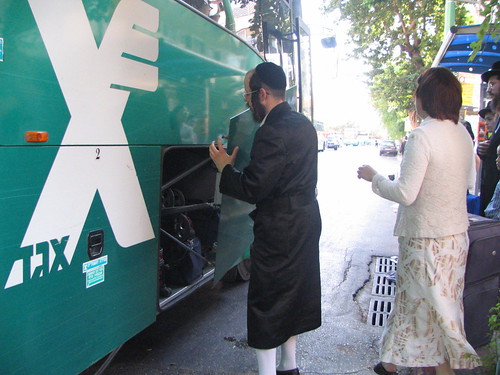The Tel Aviv City Council decided last week to recommend the operation of a bus services in the city on Shabbat. The decision, which was passed by a majority of 13 to 7, threatens to change the "status quo" that has existed in the city and around the country since before the founding of the State of Israel nearly 64 years ago. It was first Prime Minister David Ben-Gurion who agreed to implement public observance of Shabbat in Israel, a situation that has endured across the country except for Eilat and Haifa until this day. This has meant that public buses have not operated on the streets of Tel Aviv between sunset on Friday until after sunset on Saturday, and on religious holidays.
Israel is one of the few countries in the world that has succeeded in maintaining a public day of rest. These days, most countries operate shops, restaurants and other places of entertainment as well as public transportation seven days a week. The fact that many parts of Israel still manage to observe Shabbat, creates a fairly unique atmosphere on the day of rest. This is something that is noticed immediately by visitors to Israel from abroad who observe Shabbat, and who are not accustomed to see entire cities literally shut down for the day of rest. There are even those who are not observant who like the different atmosphere that Shabbat observance brings to towns and cities across Israel. Besides bringing a public face to the commandment not to work on the Sabbath day, this practice also means that employees working in these establishments will not be called upon to violate their weekend. This must surely bring an advantage in a day and age when shift work is commonplace to feed our demands to have services on tap 24/7. This culture comes at the expense of a stable family life for those workers who are called upon to work odd hours when their families wait for them at home. In Israel, keeping Saturday special by not operating commercial activities has endured as a result of the "status quo", and due to the pressure exerted by the religious groups who are very vocal when it comes to violating Shabbat.
The fact that children attend school 6 days a week from Sunday to Friday in Israel means that families wishing to undertake family trips or other activities can only really do so on Shabbat. This fact has caused many to oppose the "status quo", as this prevents many families from undertaking activities that they can only do on Shabbat. This has further fuelled the argument that commercial activities should be allowed, and even encouraged, on Shabbat. Compromise solutions have been found in some towns and cities in order to satisfy all constituencies. I am aware of some places where Shabbat commercial activities are permitted in areas which are slightly removed from the central areas of the city. This means that those who observe Shabbat, will be able to experience the tranquillity of the Shabbat without interruption. Those wishing to take advantage of Shabbat to shop or be entertained, can leave the city centre area and head to the outskirts where these activities are available. This works well for those who have their own private transportation. For those relying on public transport to seek out Shabbat activities, it is not quite so convenient due to the fact that regular public transportation does not run on Shabbat.
Those who oppose the implementation of full public transport services on Shabbat in Tel Aviv, point to the fact that the "monit sherut" (a type of minicab operating along established bus routes) offers an alternative service and for a similar price to buses. It is argued that this is enough of a service for those requiring public transport, while not encroaching on the sanctity of the Shabbat in the city centre in the way that buses would do.
Tel Aviv, as Israel's main commercial city, enjoys a special status in Israeli society. It is also held up as being a bastion of secular freedom in a country that many believe to be dominated by religious extremists. Although only a minority of Israelis (42%) define themselves as secular, it is clear that Tel Aviv has a majority of secular citizens. Tel Aviv is also Israel's capital for secular entertainment such as bars, clubs, restaurants and cinemas that remain open over Shabbat. It comes as little surprise to some observers that the "status quo" is being challenged in Tel Aviv, and that it has taken so long for this challenge to be made.
Even though the Tel Aviv City Council still has a long way to go before it can implement its decision to operate public transport on Shabbat, it seems quite determined to do so. The government ministry of transportation will need to agree to this, and there are indications that the ministry is not inclined to support a change to the "status quo". In response, the city council has threatened to operate its own private transportation if the ministry is not agreeable to running the existing public bus companies on Shabbat. Those Tel Aviv residents who sense a change is imminent, may be disappointed in the short-term as this decision is likely to take some time to implement. If the city is successful in bringing buses onto the streets on Shabbat, this will surely indicate a turning point for Tel Aviv, and for Israeli society as a whole.
Image by yanec.

No comments:
Post a Comment